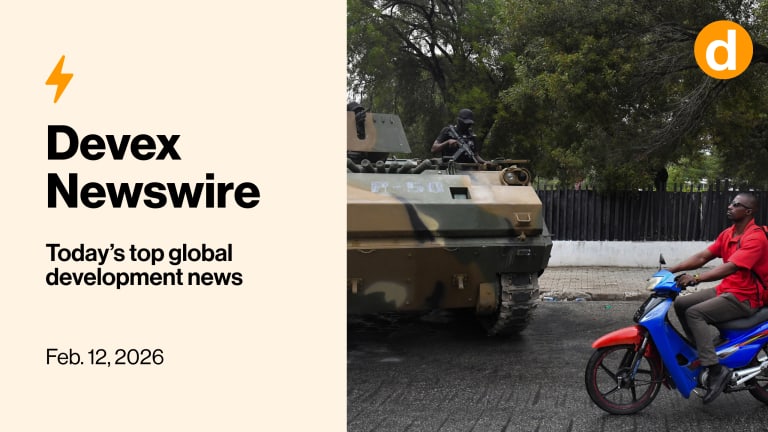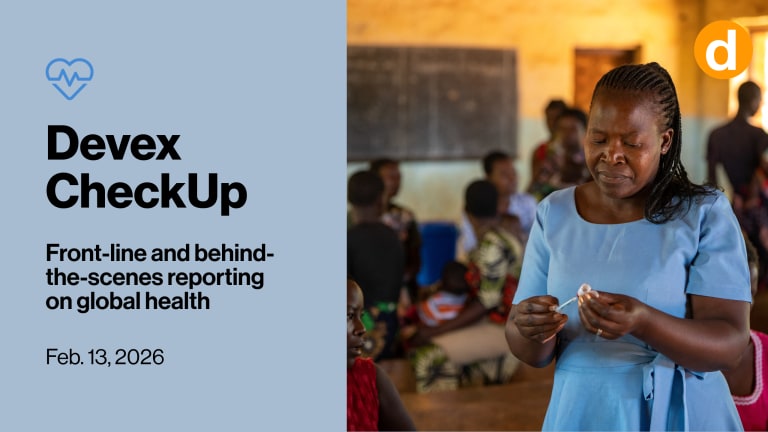Opinion: Vaccine equity is the only way out of this crisis

As coronavirus variants and vaccines clash around the world, the United Kingdom is set to take up the issue of vaccine equity in conflict contexts at the United Nations Security Council. This is a welcome development, as action in the Security Council has been lacking, and the timing could not be any more urgent in the race to immunize the world. What transpires over the coming weeks will be critical, setting a glide path for the foreseeable future and with knock-on effects at home in the United States and abroad.
Recognizing that our health security is tied to the rest of the world, U.S. President Joe Biden’s administration has come out of the gate strong. It released a road map for global COVID-19 control as one of its first actions in office and recommitted to the World Health Organization.
It also joined COVAX, showcasing support for multilateral efforts aimed at halting the spread of this deadly pandemic. Further, the administration’s national security directive includes a timeline for sharing surplus vaccines with the world and strengthening diplomatic and multilateral initiatives.
This week will be an early opportunity for the U.S. to work with the U.K. and other allies to promote equity and strengthen global governance on COVID-19 response. Immediately after the council session Wednesday, the Munich Security Conference will welcome Biden and German Chancellor Angela Merkel, among other leaders, in a special edition virtual event on the global COVID-19 response.
COVID-19 vaccines are a scientific feat — but lower-income nations are still fighting for equity
As higher-income countries plan to roll out COVID-19 vaccines to their at-risk populations, many lower-income countries remain uncertain about when high-risk members of their populations will also get their first vaccine shots.
The U.S. will then hold the presidency of the council in March, the one-year mark of the pandemic, and it could further drive global commitment to vaccine equity and pandemic response. This and other actions could, in turn, help create the necessary tail wind needed to demonstrate that international solidarity is possible — including putting the right level of ambition into a planned health summit with the G-20 group of leading nations this spring.
For efforts such as these to bear fruit, a more coordinated and strategic approach is needed.
Even before their vaccines were approved for use, China and Russia launched “vaccine diplomacy” charm offensives in many parts of the world. These diplomatic overtures may be welcome news in lower-income countries that have few or no other options on the table, even as the Chinese and Russian vaccines have not yet been approved by WHO or other major regulatory bodies. Many high-income countries, meanwhile, have secured massive volume commitments for their own populations.
The inadequate global response to the pandemic shows the challenges in our collective ability to serve self-interests and global interests simultaneously. It also points to the dangers of America’s retreat from the international stage under former President Donald Trump’s administration. While similar patterns in “vaccine nationalism” were seen during the 2009 H1N1 pandemic, the world has so far failed to heed lessons and make vaccine equity a reality.
A majority of the doses that have been deployed so far are in high-income economies, while 130 countries have not yet put a single shot in their citizens’ arms. This has serious health security implications and will hamstring global economic recovery efforts. A recent study has pointed to the $4.5 trillion cost for advanced economies alone if equitable access to vaccines is not realized globally.
COVAX aims to secure 2 billion doses by the end of 2021. Lack of funding and other difficulties have impacted COVAX’s struggle to meet this goal, making it challenging for the entity to actually deliver vaccines to 20% of the populations in lower-income countries by the end of this year.
At this rate, there is a risk that mass vaccination in the lowest-income countries may not be realized until 2024. That is three years for a mutating virus to wreak havoc on some of the world’s most fragile health systems, plummeting populations back into poverty, exacerbating social fractures, and decimating budgets and supply chains needed to tackle this and other challenges.
To prevent a more dangerous variant from spreading at home in the U.S. and to ensure an inclusive global recovery, we must reduce the virus’s circulation around the world. Donor governments should work with COVAX to develop the right mix of incentives and flexibilities to encourage utilizing the COVAX platform to distribute appropriate vaccines.
The U.S. can work in partnership with other countries, as well as leading companies and philanthropic organizations, to fund COVAX’s vitally important work. It can support manufacturing capacity in Africa and elsewhere to scale up the supply of raw materials and messenger RNA vaccines by incentivizing collaboration among the private sector and counterparts across the continent.
The U.S. Congress should also work with the presidential administration to boost recovery and humanitarian efforts by elevating the U.S. Agency for International Development and supporting multilateral initiatives in future COVID-19 stimulus spending.
The fight to contain COVID-19 is a race against time. The days ahead will be a test for whether the world can come together and realize the promise of international solidarity to achieve herd immunity. In his inaugural visit to the State Department, Biden proclaimed: “America is back. Diplomacy is back.” So, too, is the opportunity to restore leadership and global commitment in pursuit of vaccine equity. The clock is ticking.

Search for articles
Most Read
- 1
- 2
- 3
- 4
- 5









